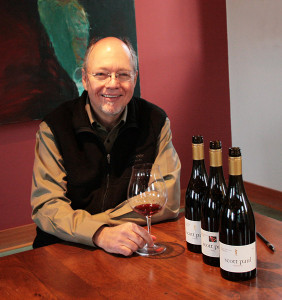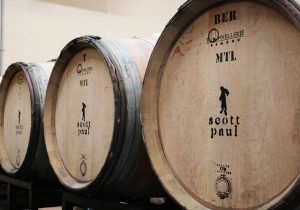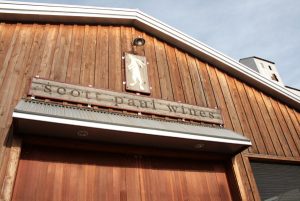
The story of self-proclaimed wine geek Scott Wright sounds much like the tales of his peers before him who have dabbled in the world of terroir. On a different path, he began his professional life elsewhere, making his way up the corporate ladder until the pull of vineyards and grapes just became too strong. Until the day-in, day-out of a demanding career became uncomfortable. Until it was time to find something more fulfilling.
When I sat next to Scott Wright, and his wife and business partner, Martha, at a winemaker’s dinner last spring, I knew I wanted to interview him for Daily Blender. As our table conversed through courses, he shared the story behind the exquisite wines poured that evening with such humility and grace that it was easy to see how he, and his winery, Scott Paul Wines, had become so well-respected. His was a tale of a higher calling, now highly regarded for producing some of the most divine red wines in the region.
Sitting down for a taste of Scott Paul Wines’ Dom Denise – named for a French winemaker from the 1700’s who inspired the vintage, with only 100 cases made – I asked Scott to recap his journey to wine country, on the record this time, during a visit to his Dundee, Oregon tasting room last December.
Tell Me About The Grapes
Q: You have an unusual background. Where did you begin?
A: It’s been a long and winding road. I started off as a radio personality, first in small markets and then working my way up until I was nationally syndicated. On the air. As a rock-n-roll radio personality. For twenty-five years. Loved it, had a good time. I was one of the lucky ones who burst through the pack and ended up having a really nice career. My stepfather owned a record shop, and I just grew up around music.
 Q: How did you go from music to wine?
Q: How did you go from music to wine?
A: My stepfather was also a big food and wine guy, and we always had wine on the table. It started when I was eleven or twelve, and they would let me taste the wines, whatever we were having for dinner. By the time I was in high school, I realized I was fascinated by it. All the wines were different and I wanted to know why.
So, while I was working my way up through the radio business, I continued to indulge my passion for wine as much as my financial situation would allow me to. [laugh] More and more as time went by. And then I segued out of the radio business and into the record business. I was the head of marketing and promotion for Sony Music, for their Epic Records label. I worked really closely with Michael Jackson, Celine Dion, Pearl Jam, Ozzy Osbourne. All sorts of people. I did that for a few years, and then I had my own company with three other partners – we were consultants to all the major labels. We did promotion and marketing for everybody. We did that for six years until it wasn’t fun anymore.
During that time, my passion for wine had really exploded and my burgundy geekdom had gone further down the black hole. I found that I was spending more time with winemakers. Going to tastings, going to auctions, buying wine, tasting wine, reading about wine. It occurred to me that maybe I wanted to go do this for a living.
We moved from Los Angeles to Napa Valley and a friend of mine became my mentor and took me under his wing. He let me hang around, work the harvest. He really helped me get started. In 1999, I was able to buy fruit from a number of well-established vineyards in the area, and fortunately, the wines came out really well. So we launched our little label – with 400 cases in the 1999 vintage.
 Q: Where did Oregon come in?
Q: Where did Oregon come in?
A: We had spent some time up in Oregon, and had started off the label just doing pinot noir and a little bit of chardonnay, but wanted to do something up here as well. So starting in 2000, we were making wine in both places, in both California and Oregon, which proved to be logistically difficult. I met the Drouhins around the same time, and was hired to be the general manager of Domaine Drouhin. The opportunity came to take over the management and I thought was just an unbelievably exciting opportunity. I learned a ton – so much – and had a fantastic experience working with them. I got to the point where Scott Paul had become something I really needed to focus my attention on if we were going to make a business out of i, so in 2004, I left to work on Scott Paul full time.
Q: What are some of the difficulties you’ve experienced facilitating the company and winery?
A: We were very fortunate that we were able to cut through the clutter early on, before there became such a huge proliferation of labels in the area. We always had a focus on connecting directly with the consumer, making sure we’re available through local distributors so we can be at the best restaurants around town. It’s so important for building the brand, for having visibility, for finding the consumer who appreciates a great pinot noir. But I was very naïve when we started in the wine business, and didn’t know any better, and just jumped in and expected things were going to go well, and somehow they did. I don’t really have any other explanation for it, other than I’ve always believed in the “Leap, and the net shall appear” school of business. We just sort of leapt and so far, the net has been there to catch us.
It’s a lot more difficult than what it would appear from the outside. The distribution business over the last ten years has consolidated so much that there are just a handful of major distributors around the country and most of them are not interested in carrying small producers like us, because of the smaller volume. To get the attention of a distributor, in order to really do a good job in the marketplace, is really challenging.
Q: What do you do to keep sales up?
A: Well, connecting directly with the consumer is a whole other skill set. Just because you know how to make good wine doesn’t necessarily mean you’re a consumer marketing person. Fortunately Martha and I both have backgrounds in it, so I think that really helped us get a leg up in the beginning, knowing how to connect with our customer.
And so far so good! We have a really healthy direct-to-consumer business, our distribution business keeps us in the wine shops and restaurants around the country. But it’s much harder than it was ten years ago, and it doesn’t look like it’s going to get any easier anytime soon with the way the economy has been. So, for us, to be surviving and paying the staff and keeping the lights on and making a living doing this in this day and age, we consider ourselves to be very fortunate.
~Jennifer Heigl
**Photo credit: Jennifer Heigl / Daily Blender
